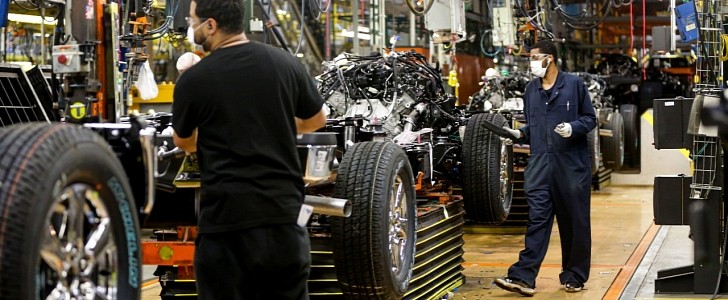Just like General Motors, Ford has been struggling with the global semiconductor shortage, turning to all kinds of solutions in an attempt to minimize the disruptions caused to its operations worldwide.
But of course, not everything worked, and eventually, Ford is forced to just accept that the lack of chips hit its production in a substantial manner, not just in the States but elsewhere too.
The company’s most recent production stats for the Chinese market show just how much of a nightmare the chip shortage, when combined with the health crisis and the floods in Central China, ended up causing.
More specifically, Ford says its sales in Greater China in the third quarter reached 150,100 units, and this represents a decrease of no less than 8.7 percent when compared to the same quarter a year ago. And when looking into perspective, the numbers are awful, especially since 2020 was a year when everybody struggled to recover after the craziness that hit the planet.
Lincoln was the one that brought good news to Ford, as the brand recorded a passenger car sales growth of 24 percent.
Whoever wants to see the glass half-full can just look at Ford’s market performance in China in the first three quarters. During this period, the company posted a growth of 11 percent thanks to 457,000 cars sold in the country, again with Lincoln recording a growth of no less than 68.7 percent.
Without a doubt, the global chip shortage has caused massive disruptions for Ford, but on the other hand, it looks like the company has so far been hit harder in its domestic market than in China. In the United States, the American carmaker delivered a little over 400,000 cars in the third quarter, and this represents a 27 percent year over year.
Industry analysts expect the chip shortage to ease off in the coming months before the recovery gains more pace throughout 2022. By 2023, the market could end up facing an oversupply of chips, some warn.
The company’s most recent production stats for the Chinese market show just how much of a nightmare the chip shortage, when combined with the health crisis and the floods in Central China, ended up causing.
More specifically, Ford says its sales in Greater China in the third quarter reached 150,100 units, and this represents a decrease of no less than 8.7 percent when compared to the same quarter a year ago. And when looking into perspective, the numbers are awful, especially since 2020 was a year when everybody struggled to recover after the craziness that hit the planet.
Lincoln was the one that brought good news to Ford, as the brand recorded a passenger car sales growth of 24 percent.
Whoever wants to see the glass half-full can just look at Ford’s market performance in China in the first three quarters. During this period, the company posted a growth of 11 percent thanks to 457,000 cars sold in the country, again with Lincoln recording a growth of no less than 68.7 percent.
Without a doubt, the global chip shortage has caused massive disruptions for Ford, but on the other hand, it looks like the company has so far been hit harder in its domestic market than in China. In the United States, the American carmaker delivered a little over 400,000 cars in the third quarter, and this represents a 27 percent year over year.
Industry analysts expect the chip shortage to ease off in the coming months before the recovery gains more pace throughout 2022. By 2023, the market could end up facing an oversupply of chips, some warn.














